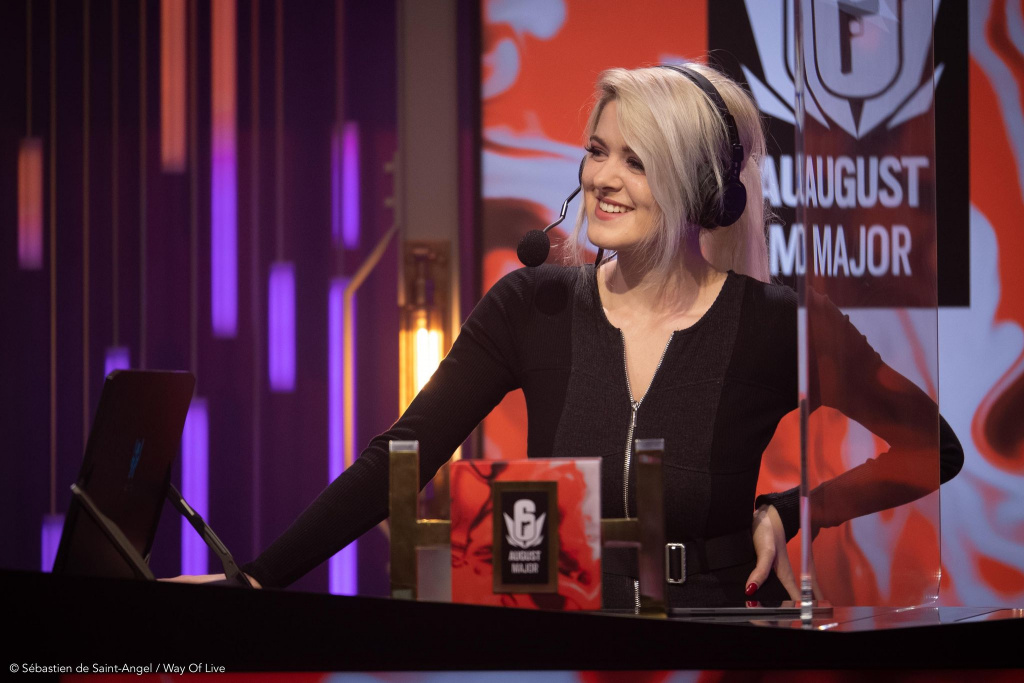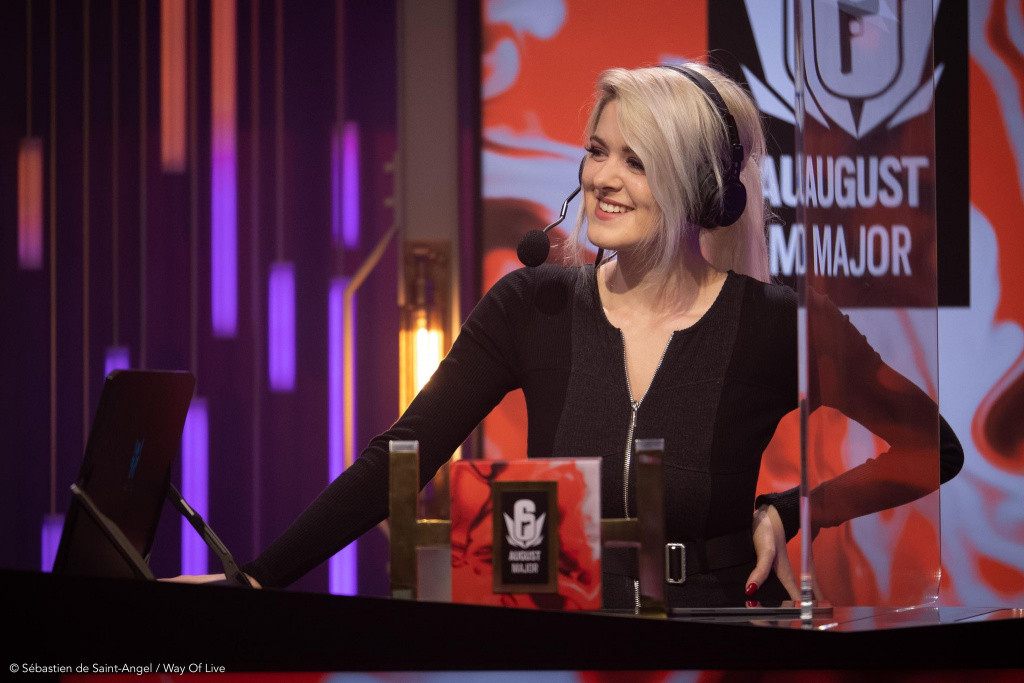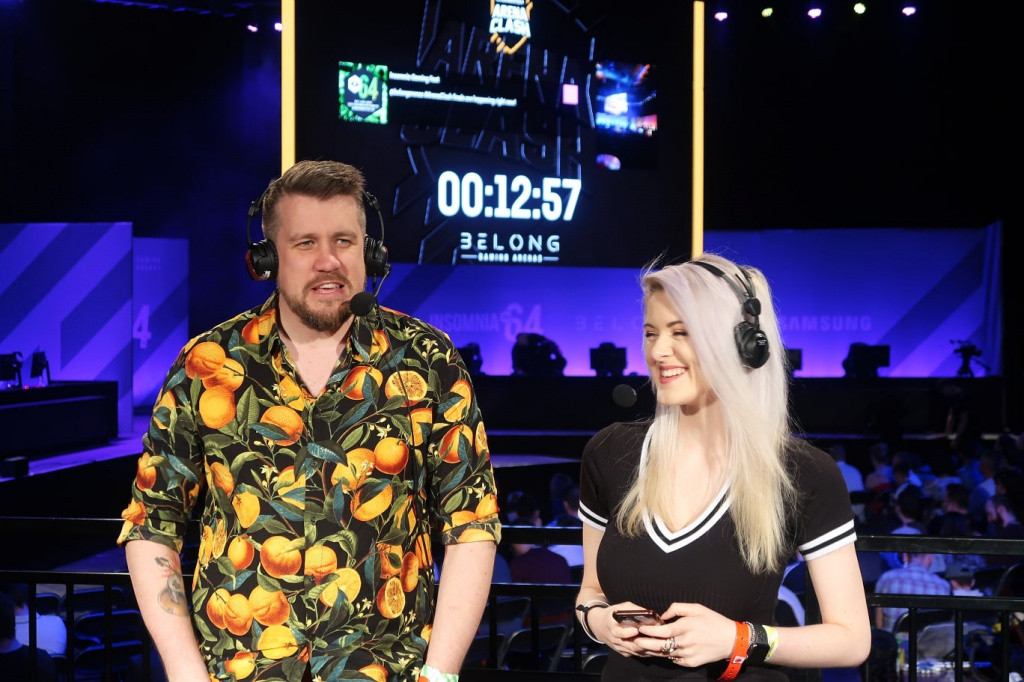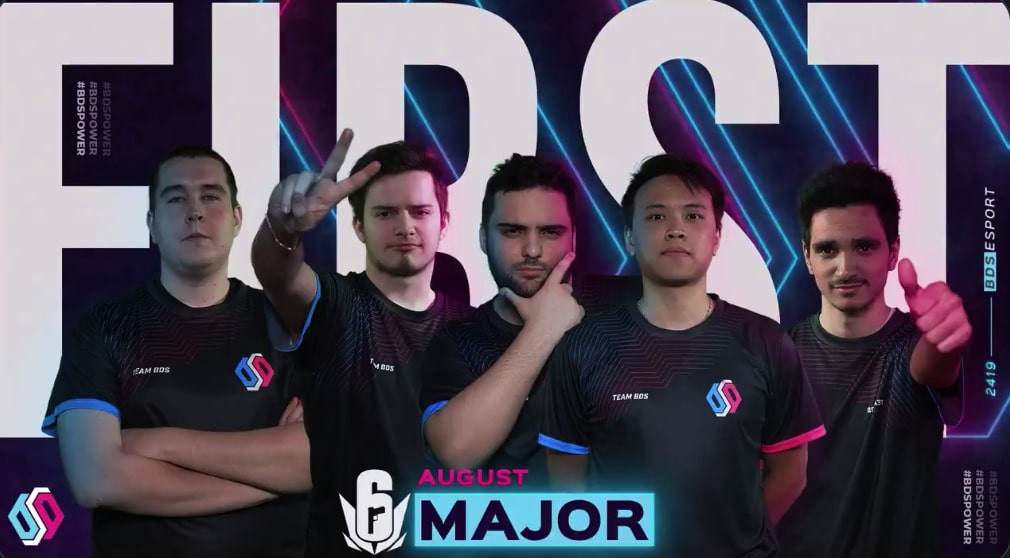
If you’ve tuned into Rainbow Six Siege’s European scene over the past year, you’ve probably encountered Geo “Geo” Collins, 24, casting various tournaments.
Starting out covering the ESL Premiership and European Challenger League, Geo is now casting A-tier matches in the revamped APAC North and European Leagues. The latter saw BDS Esport take the first EU Mini Major of the year in August, with the second round of Majors taking place in November following Stage 2.
Ahead of Stage 2’s conclusion, we spoke with Geo about her enormous leap through Siege esports, transitioning to a play-by-play caster, and what it takes to get into the industry.
Geo switched from Overwatch to Rainbow Six Siege (Picture: Seb Stangel/Way of Live)
Let’s start from the beginning, how did you get into casting?
I got into casting on a pretty YOLO moment after I crashed and burned out of university. I had a really big health scare in my last year, which made me not want to go on and do my Masters, so I decided to quit once I got my Bachelor’s.
I’d always wanted to work in video games and I’d always been interested in doing things on camera. I didn’t really care how I was going to do it, I didn’t care how difficult it seemed or how tall the mountain appeared to be, because at that point I was like, “I’ve just got to do what I think is going to be fun and do it for myself”. So I started doing things online, some small scale things in Overwatch and gradually I got bigger and bigger opportunities.
How did the switch to Rainbow Six Siege happen?
I started out in Overwatch, which was a game where I was very involved in the community anyway. It was around the same time that I first had an interest in Siege but because I got so swept up in Overwatch, I decided to commit to that.
After a number of months, I decided I didn’t want to commit to Overwatch anymore for a variety of reasons. Finally I decided, I want to go to Siege. And I suddenly found myself back in that same position where I was like, “I actually don’t know what I’m going to do here because at this point it’s my full-time job”. I couldn’t afford to start from the bottom again and I ended up getting lucky and being offered the job on EU League – so things worked out, but I suppose it could very nearly not have.
When you’re switching games, what goes into that decision? Is it the game itself, the community, or something else?
There’s a number of things I suppose. Because casting was my full-time job very early on, I have to really consider the financial viability of staying or moving to a different game. For me, I don’t think I’d ever go to a game I didn’t have an interest in. Siege was a community I really liked, an esport I really enjoyed, and over time I had garnered a number of friends who were already in or worked in Siege, so I had an emotional connection both through my interest in the game and the people who were already there. For me, that was a big pull.
Geo casts European and APAC North Leagues
Obviously I still cared about the people in Overwatch and I still love the game, but leaving Overwatch really came from an opportunity standpoint and where I felt like there was not always a future. So those are I suppose a number of things you have to consider in that instance.
What is the process like of studying a new game? Is it mostly grinding the game constantly?
Because I was a colour caster, you have to know the game pretty well. I already played Siege so I was familiar with the game, I already watched the esport, but in Siege there’s a lot of intricacies that take a lot of time to pick up and understand to a sufficient level.
For me, it involved a lot of studying. A number of people say “oh just play the game”. I already played the game but the fact is, I’m not good enough at any video game to play it at a level where I’m going to learn faster from the game over studying someone else playing it. So I definitely had to do that. I would often go into my ‘study sessions’ per say with specific goals, like I’m going to focus on this part of the game or this. I would watch other people’s casts or analysis and I would focus on what they were saying, and try and get a feel for the lens through which they were seeing the game. That all really helped.
As time went on and I got better, actually being in the game helped more than it would have in the beginning. There’s still so much to learn and I think anyone in Siege can say that for themselves, no matter how far up the food chain or knowledge tree they are.
You’ve now switched from colour casting to play-by-play, how do you feel that transition is going?
That was really nerve-wracking because in my nearly two years of being in esports, I’ve never been a play-by-play caster. To suddenly have it thrust upon me and be like, “wow I’ve got to learn this entirely new dynamic of which I’m vastly unfamiliar”. I was really scared and nervous at first but within a couple of days, once I kind of got into the swing of things, I started to really enjoy it.
It’s very different to what I’m used to and it’s interesting seeing that the way I even look at the game when casting is different. As a colour caster, you have the time during the action to take a step back, look at things holistically, pick out the parts you like, and already think about what it is you’re going to say. As a play-by-play, you don’t get that luxury. You basically have to say things as they happen and you don’t really have the time to step back and think. You have to rely on your colour caster to do that, it’s more your job to manage the energy of the game and make sure that’s being delivered well.
I was never really a hype caster as a colour caster. I always casted with people who were really good at that kind of thing, so it’s been a new skillset to unlock. But I’ve surprised myself at how I feel I’ve improved in a short amount of time and how much I’ve enjoyed it.
You’ve posted videos about your casting journey so far, is that largely to see your own improvement or to inspire others too?
The main reason I did that video about improving in casting is because, at the start of the EU League, even though I had already been in the Siege community a while, there a number of people who didn’t necessarily know who I was. My rise through the Siege community had been pretty quick, and I wanted to make it clear to people that I really cared, and that I really gave a sh*t to be perfectly blunt about it.
I wanted to be transparent about the way I was thinking about my improvement and how I was approaching it, because improvement takes a certain amount of time, and there’s no guarantee that the people watching you are understanding what’s going on behind the scenes to improve. It was partly for myself, but mostly because I wanted to share with the community that I really cared, this is the work that I’m doing and here’s my goals from this, and this is where I want to be. And this is why I’m doing it because I care about this game and I care about this esport.
Is there anything you feel goes overlooked in regards to the challenges of casting?
The obvious one is it’s very easy to make mistakes while casting, because you have to think so quickly and you can’t see everything that’s on screen. Every caster will say this, but the number of times you watch back a cast you did and you see something you miss that would have changed the narrative that you were spinning. It’s very frustrating to look back and be like, “dammit, I knew that”. Or if you say something wrong, you’ll be like, “I knew that, I should have said something different”.
It’s not worth anyone’s time to get caught up in that and you have to move forward, but as a viewer it can be very easy to watch and think “oh the caster said it wrong, they clearly don’t know”. That’s not always the case. I think the intricacies of balancing out casting between analysis, banter, play-by-play and downtime – it’s a very intricate job to master that balance. Obviously as a viewer, everyone’s taste is going to be different as to how they like that to be. Some people like humour being injected in, some people really don’t, so you’re never going to please everyone but ultimately you just have to stay true to what you think is beneficial and conducive to your own improvement.
BDS Esport took the first EU Mini Major in August, do you think they’re on course to pull off the double in November?
I’d be very surprised if BDS Esport didn’t take the European one. They’re currently a powerhouse of Europe, they kind of have been for all of 2020 because they were the only European team who made it to the staged play-offs of the Six Invitational. They weren’t the only team in playoffs, but they were the only ones who actually made it to the stage.
Then they just came into EU League as this unbeatable force that no one seems able to bring down, so I’ll be very surprised if they slipped up and lost the top spot in the Major in November.
Will BDS take the second EU Major of the year? (Picture: BDS Esport)
You’re casting for the APAC North League as well, are there any differences between casting for EU and that region?
Obviously by region the meta will be slightly different. The interesting thing about APAC North is it’s a region that didn’t exist prior to this overhaul of the Rainbow Six format. Previously in APAC, all of the regions were split into sub regions that had individual Pro Leagues like Japan,Korea and South East Asia. For APAC North a number of these sub regions have been brought together.
So for the teams, this is a huge learning curve because you have all these different play-styles, all these different metas that come together – and a team who may have thought they were the best in a sub region suddenly has to go up against all these adversaries who have different ways of playing. It’s the fastest way to improve going up against teams who have a different way of doing things, but it’s obviously shaken up a lot of what’s happened in that area of the world.
Now it’s Stage 2, it’s very interesting because all the teams are a lot more comfortable in understanding with the way this new region plays now. So now it’s being developed and improved, we’re seeing a lot more objective-based play than we did last stage, but overall the play-style is remarkably removed from the play in Europe and North America for example.
Is there any advice you’d give to aspiring casters?
I’d say be realistic about your expectations. By that I don’t mean, just remember you probably won’t make it. I don’t really like it when people say that because at the end of the day, when I started, I probably wouldn’t have made it and then I did.
Always believe that you can make it, but by being realistic about your expectations, don’t compare yourself to people who are in a different place to you. That’s a really big mistake that I made and I wound myself up and made myself miserable over it at the start in my career. So make sure you’re trying to get experience, you’re focusing on the right things, give yourself honest feedback and work well with your duo. You might think that you’re great as a caster as an individual but a caster is comprised of two people, and you have to work really well together.
So work well with your duo, give each other feedback and also build a social media presence. This is a piece of advice that people never seem to give but as an industry it is so based on your presence and your visibility online, that having a solid brand that you can offer to a tournament organiser as a selling point is invaluable and you need to start working on it now. No anime profile pictures, no random tweets about stuff that doesn’t help you move forward. Remember your social media is your job, it is part of your profession. Nurture it, look after it and build it.
You can catch Stage 2 matches streaming on the Rainbow Six Twitch channel.


